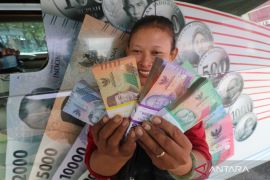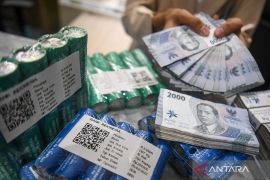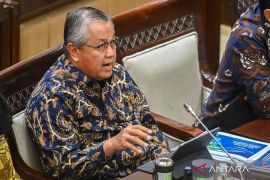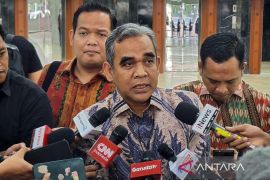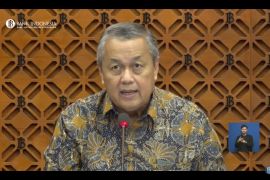In the face of the falling value of the rupiah, which on Wednesday reached Rp14,922 per US dollar from Rp14,896 on the previous day, the government must focus on resolving the problem.
"This is the time for the government and the business world to sit together to address the rupiah depreciation that burdens the community. I am worried that the increase in prices and production costs of companies will lead to layoffs," Sandiaga Salahuddin Uno, a politician with a business background, and the running mate of presidential candidate, Prabowo Subianto, stated.
Uno even noted that is not the time to mix politics with economics issues. He noted that the Indonesian peoples should not spend more time dealing with politics. "We should not mix economics with politics. Just focus on the economy first, that is what we hope for," Uno remarked.
He expressed hope that the economy will be the center of our attention. "We should stop `political bickering` first and focus (on improving the economy). I do not see catalysts that can stabilize our economy in the next six to nine months. Therefore, we must unite," he pointed out.
Today, he stated on Tuesday (Aug 4), the rupiah exchange rate against the US dollar was at the level of Rp14,896.25. This requires the government to be aware of the adverse effect, especially the price of basic needs of the community.
In fact, he expressed concern over the weakening of the rupiah exchange rate, which will affect the company`s production costs, leading to the potential for termination of employment or layoffs.
He reminded the government to start tightening belts and delay imports that were not needed. "Postpone dollar-based expenditures, delay the import of unnecessary goods, and encourage the use of local products," he added.
Monetary analyst Lukman Leong of Valbury Asia Futures shared the view of Uno regarding the need to restrain from imports.
Indeed, the Indonesian government has planned to restrict the importation of certain commodities. It has also planned to stop importing built-up cars completely, with an engine capacity of above 3,000 cc, and review orders for luxury cars amidst the rupiah`s weakening against the dollar.
Amidst the rupiah`s weakening against the dollar, the government is apprehensive that the purchase of luxury cars will jeopardize the national economy.
Therefore, Leong is optimistic that the government`s various polices, including the restriction in the importation of 900 types of consumption goods, would reduce the deficit of the balance of payment.
Thus, the market players will set sights again on Indonesia as a country with good economic fundamentals, he remarked.
"The weakening of the rupiah is still within the acceptable reason. The negative trend took place not only in Indonesia but also in other developing countries," Lukman stated in Jakarta on Wednesday.
In the foreseeable future, the movement of the rupiah against the US dollar will still be overshadowed by pressure amid the lack of positive sentiment circulating in the market, he continued. "The world`s major currencies are also in a negative trend towards the US dollar," he added.
However, according to Bank Indonesia (BI) Governor Perry Warjiyo, pressures against the rupiah will decline next year. Warjiyo told the House of Representatives` (DPR`s) Budget Body meeting on Tuesday that the US dollar`s strength would still affect the value of the rupiah in the last three months of the year.
This is due to market expectations regarding the US Federal Reserve Bank, which will raise its benchmark interest rates in September and October 2018. "But because the Fed`s benchmark interest rate increase is lower in 2019, the pressure on the exchange rate will not be as heavy as this year," Warjiyo stated.
In addition to the normalization of the Fed`s monetary policy, the dynamics of the global trade war initiated by US President Donald Trump`s policies will also weaken the currencies of developing countries, including Indonesia.
The domestic financial market is still vulnerable to negative external sentiment due to foreign ownership of domestic financial instruments, including government securities that are still quite large.
This year, the Central Bank is expecting the Fed to raise its benchmark interest rate four times. An increase in the interest rate policy has been made twice by the Fed in March 2018 and June 2018. There are still two more times when the Fed`s benchmark interest rate will increase from the current level at 1.75 to 2 percent.
In the meantime, Chief Economic Minister Darmin Nasution remarked that the economic policy that has been produced by the government would help speed up the stabilization of the country`s rupiah exchange rate.
"We have already moved. However, despite how fast we move, market response will not be faster. It means it will take time. We believe the exchange rate will be more stable in the days to come," he stated.
Nasution noted that the policy was aimed at improving the balance of trade and the current account, which was now still deficit that had caused the weakening of the rupiah.
He noted that the policy includes efforts to improve the ease of doing business through an integrated service system, boost export-oriented investment, and provide tax incentives to businessmen.
To anticipate the movement of the exchange rate, the government, together with BI and the Financial Services Authority (OJK), will continue to maintain the rupiah to reflect economic fundamentals. Rupiah is expected to be managed and absorbed in the economy properly.
"Thus, the stability of the economy and the financial sector will be maintained. We will continue to be aware of the movement of the rupiah exchange rate triggered by global sentiment and changes in the policy of the United States," Finance Minister Sri Mulyani noted.
Editing by Bustanuddin
Reporter: Andi Abdussalam
Editor: Fardah Assegaf
Copyright © ANTARA 2018


